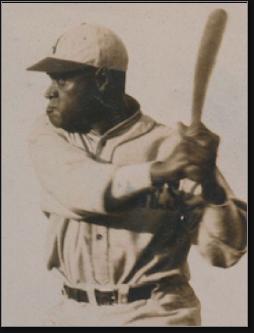
Sport: Baseball
Born: April 25, 1884
Died: March 19, 1964
Town: Atlantic City, New Jersey
John Henry Lloyd was born April 25, 1884 in Palatka, Florida and grew up in the Hansontown section of Jacksonville. He was a hard worker as a boy and quit grade school to earn money for his grandparents, who raised him. A great fire consumed much of Jacksonville when John Henry was a teenager and the rebuilding effort was a boon the African-American community. Several ballfields were constructed to lure Spring Training teams and permanent minor-league clubs. It was on these fields that John Henry first began producing line drives—at first in pick-up games and later as a member of a local semipro team.
John Henry had the cool temperament to let the game come to him. Unlike most young players, he saw mistakes as learning opportunities. These qualities would later define him as a player-manager.
John Henry got his big break in pro ball with African-American teams in Philadelphia, where he played for two giants of black baseball, Rube Foster and Sol White. John Henry was already a superb left-handed hitter, but became an outstanding shortstop in Philadelphia and later with teams in Chicago and New York. John Henry also played winter ball, primarily in Cuba, where he often faced white major leaguers. He also worked and played for winter resorts in Florida, where he performed for the entertainment of guests.
Reports of hisJohn Henry’s prowess quickly spread around the game, with some calling him “The Black [Honus] Wagner.” Both men had tremendous skills and enormous hands. When Wagner heard about this he said he was honored to be compared to John Henry Lloyd. Many years later, Babe Ruth said John Henry was the best player he ever saw.
Although he had played in exhibition games in New Jersey in his 20s, John Henry’s association with baseball in the Garden State truly began in 1919, when he was in his mid-30s. By then he was known as “Pop.” He joined the Bacharach Royal Giants in Atlantic City, a team named in honor of mayor Harry Bacharach. The club had actually begun in Jacksonville, so John Henry had some familiarity with its owners. As fans of Boardwalk Empire know, Atlantic City had a vibrant African-American community that was financially and culturally intertwined with the hotels that dotted the famous boardwalk.
John Henry was a baseball vagabond, following the money from city to city during the ’teens and early 20s. After four years away, he returned to Atlantic City in 1924. He managed the Bacharachs—now members of the Eastern Colored League—and played second base, moving over to accommodate the younger Dick Lundy.
Pop Lloyd was now 40, but he was still a solid .300 hitter. During the 1924 season, he knocked out hits in 11 consecutive at bats. In 1925, he was on the road again, although Atlantic City would remain something of a “home base” for the remainder of his playing career. In 1932, he agreed to play his final few games for the Bacharach Giants and then retired at the age of 48. His batting average in league games was estimated to be over .340 and, in at least four of his prime seasons, he was regarded as the best player in black baseball.
In the years that followed, Pop turned down several offers to manage Negro League teams and settled into stable employment with the Atlantic City school system as a custodian, and worked in the post office on the city’s West Side. He also was a coach for the Atlantic City Johnson Stars (named after the notorious Nucky Johnson) well into his 50s. Occasionally, he played an inning or two to give the fans a thrill.
Pop’s presence in Atlantic City’s schools kept him connected to baseball. He gave advice and coaching tips to countless players during the 1930s and 1940s and became one of the town’s most admired public figures. In 1949, a new municipal baseball park was named in his honor. John Henry passed away in 1964 at the age of 79. He was posthumously inducted into the Baseball Hall of Fame in 1977.